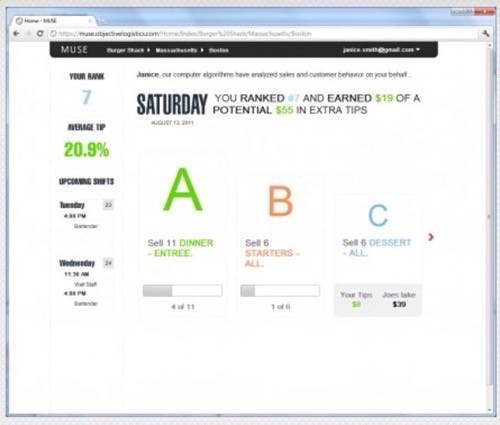A Boston-based company is creating a system to make the workforce more accountable and eliminate inefficiencies, starting with the restaurant industry. Objective Logistics works through a restaurant’s point-of-sale system to create data points. These are fed into a cloud to make your waiter or waitress more accountable and make the restaurant more money.

Google Ventures thought it was a good idea. Along with Atlas Ventures, Objective Logistics raised a $1.5 million seed round this morning to further expand its reach and capabilities. The use-case scenarios are endless.
“We consider ourselves to be eliminating inefficiencies,” said Phil Beauregard, co-founder of Objective Logistics. “We are interested in ranking and rating employees in the work place and cutting dead weight loss.”
Have you ever been to a restaurant and noticed the tap screens that your server is inputting orders with? Those are called point-of-sale terminals and they are expensive investments for restaurants. There are dozens of POS makers but the primary ones are Aloha, Micros and POSitouch. Inside these POS terminals there are a variety of data points that can be triggered, from average revenue per guest, to tip size, to breakdowns of every item sold in the restaurant. Over the years the POS terminals have grown more sophisticated and require significant manager training to, from the service industry on outknow everything that the system can do.
Objective Logistics has built software, called MUSE, that uses algorithms to analyze all of the product sold and employee performance.

Objective Logistics goes into the POS terminals and gathers the data points and then feed them to the cloud for performance breakdown analysis per server. Is Tommy selling the steak? Is your bartender pushing the high-end liquor? Those who perform the best are then rewarded with the ultimate incentive in the restaurant industry – the ability to pick what shift you want. Friday night is certainly better than Monday morning when you are trying to pay rent off tips.
Essentially, Objective Logistics is creating an external data analysis tool to weed out the lazy or ineffective employees. It then adds game mechanics to incentivize them. Employees have leader boards, rankings and mini-contests. A lot of this happens in restaurants anyway, but Objective Logistics codifies it in a simple but meaningful way. Beauregard mentioned that the rewards initially come from the restaurant owners but there is significant potential with brand partnerships. Sell the most Budweiser for the year, win a trip to St. Louis or something of that ilk.
“Waiters and waitresses are the largest hourly sales force in the world,” Beauregard said. “The idea is to self-motivate (sic) them to perform better … we have created the Rosetta Stone of POS translators.”
Objective Logistics, like most POS systems, is built on Microsoft’s .NET structure, tying into Microsoft’s Azure cloud.
Beauregard has the perfect background for developing MUSE for the restaurant industry. He started in restaurants as a dishwasher at 14 years old and stayed in the industry through college, finishing as a manager. He got a Bachelor of Science at the Wharton School at the University of Pennsylvania and studied microeconomics and behavioral science, among other things. After a couple of stops with investment banks, the idea for Objective Logistics fell into his lap, with the help of CTO Matthew Grace.
Any service industry that has a data input method like a POS terminal can benefit from a system like Objective Logistics.
Some may say we are using data to a fault, over-analyzing every aspect of life and work. To a certain extent this is true. The eye test will still tell suffice most of the time and a chef usually knows who his top servers are without a computer. But companies looking to exploit market inefficiencies can use data to get a step up on the competition. Even if it is just a server slinging soda and hamburgers.

















